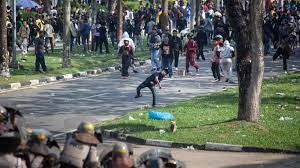Thousands of Israelis demonstrate in Jerusalem against Prime Minister Benjamin Netanyahu’s legal reforms
In a last-ditch show of force to stop Prime Minister Benjamin Netanyahu’s divisive judiciary reform, tens of thousands of demonstrators marched into Jerusalem on Saturday evening while hundreds of thousands of Israelis flocked to the streets in Tel Aviv and other cities.
Additionally on Saturday, hundreds more military reservists said they would no longer report for service in protest against the law, and more than 100 former Israeli security chiefs signed a letter calling with the Israeli prime minister to block the legislation.
The parade into Jerusalem transformed the city’s main gate into a sea of blue and white Israeli flags as marchers finished the last stage of a four-day, 70-kilometer (45-mile) journey from Tel Aviv to Israel’s parliament in sweltering temperatures that reached 33 C (91 F).
Thousands of applauding demonstrators greeted the marchers as they arrived in Jerusalem, and as they set up camp outside the Knesset before Monday’s anticipated vote, the marchers’ numbers increased from hundreds to thousands. In the meanwhile, tens of thousands thronged the streets of Tel Aviv, the seaside city that serves as the nation’s commercial and cultural hub, as well as Beersheba, Haifa, and Netanya.
According to Netanyahu and his far-right friends, the reform is necessary to rein in what they think are the unelected judges’ enormous powers. However, its detractors claim that the proposal would undermine the nation’s system of checks and balances and move it closer to authoritarian leadership.
Netanyahu has been encouraged to put the proposal on hold and look for a wide agreement by US President Joe Biden.
Business and medical leaders have harshly criticized the planned changes, and an increasing number of military reservists in important units have said that they would no longer report for service if the proposal is approved, raising concerns that the nation’s security interests may be in jeopardy. According to “Brothers in Arms,” a protest organization that advocates for retired soldiers, an additional 10,000 reservists said on Saturday night that they would be postponing their duties.
In support of these requests, over 100 former senior security officials, including retired military commanders, police commissioners, and directors of intelligence agencies, signed a letter to Netanyahu on Saturday accusing him of weakening Israel’s military and pleading with him to stop the legislation.
Former Israeli prime minister Ehud Barak and former army head and defense minister Moshe Yaalon were among the signatories. Both are Netanyahu’s political adversaries.
The law, according to the former officials, “is crushing those things shared by Israeli society, is tearing the people apart, is dismantling the IDF, and inflicting fatal blows on Israel’s security.”
“The legislative process violates the social contract that has existed for 75 years between the Israeli government and thousands of reserve officers and soldiers from the land, air, sea, and intelligence branches who have volunteered for the reserves for many years to defend the democratic state of Israel, and now announce with a broken heart that they are suspending their volunteer service,” the letter stated.
On Monday, the law will pass in some fashion, according to Likud party leader Benjamin Netanyahu’s senior Cabinet minister Israel Katz.
According to the man, who spoke to Channel 12 TV, “I represent citizens who are not ready to have their voice canceled because of threats of refusal to serve” or by those who are obstructing the airport, roads, and railway stations. “This is obviously an attempt to use military service to pressure the government into changing policy,”
The grassroots protest movement has reached a fever pitch after seven months of the longest and most frequent protests the nation has ever seen.
Monday’s vote by the parliament is anticipated to restrict the Supreme Court’s ability to oversee the administration by prohibiting judges from overturning executive orders on the grounds that they are “unreasonable.”
The existing “reasonability” criterion, according to supporters, gives courts enormous control over the choices made by elected authorities. However, depriving the government of the criteria, which is only used seldom, would, in the opinion of opponents, enable it to make arbitrary judgments, hire or fire people in the wrong positions, and invite corruption.
The first significant piece of legislation would be adopted on Monday.
The revamp also asks for other significant adjustments intended at reducing the authority of the judiciary, such as restricting the Supreme Court’s capacity to review legislative judgments and altering the selection process for justices.
Wide segments of Israeli society are protesting, and they view the reform as a power grab by Netanyahu, who is on trial for corruption, and his allies, who want to strengthen Israel’s grip on the occupied West Bank and continue the contentious exemptions from the draft for ultra-Orthodox men. Netanyahu is currently facing these personal and political grievances.
Netanyahu reaffirmed the revamp in a speech on Thursday, calling the claims that it will undermine Israel’s democratic roots preposterous.
He said, “This is an effort to deceive you with something that has no foundation in reality. According to sources in Israeli media, the country’s defense minister, Yoav Gallant, pressed for a postponement in Monday’s vote because he was alarmed by the rising number of reservists who were refusing to serve. Nobody knew whether others would follow him.







